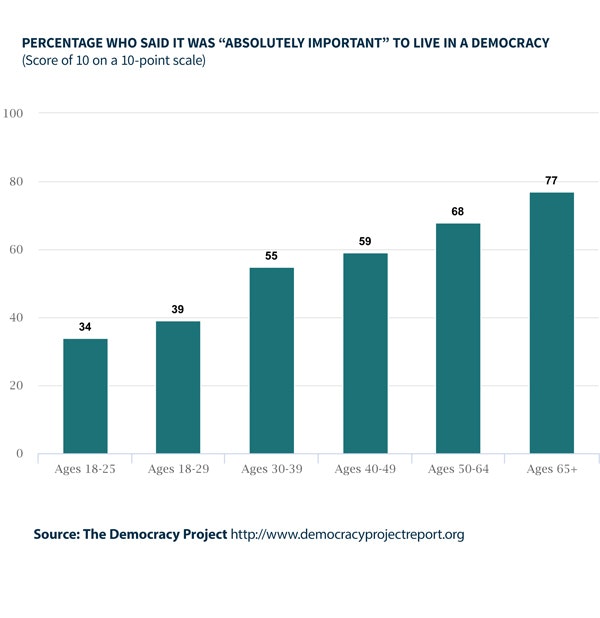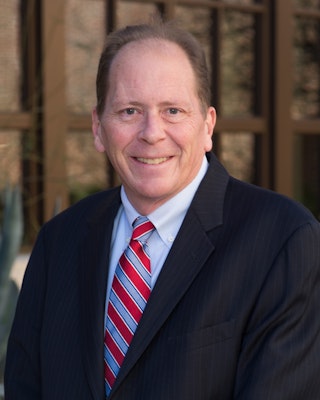Strengthen America's Democracy with More Democracy
As America’s young and nonwhite population grows, many feel they are not benefiting from democracy. Fighting to defend equal rights for all can help restore trust in key democratic institutions for the rising generations of Americans.

The growing sense that democracy is not delivering enough on the promises of opportunity for all is one reason that democracies around the world are reeling from populist movements. That includes our own country, where the promise of the American Dream seems elusive for too many people.
This disconnection is one of the reasons why the Bush Institute has partnered with Freedom House and the Penn Biden Center for Diplomacy and Global Engagement on the Democracy Project. The public opinion research program is examining the health of America’s democracy and gauges American attitudes on some of the challenges facing it.
Those challenges are not necessarily new. Since Watergate, our democratic system and the institutions that support it have become weaker. Confidence in institutions such as Congress, the media, the courts, and business have all declined.
Since Watergate, our democratic system and the institutions that support it have become weaker. Confidence in institutions such as Congress, the media, the courts, and business have all declined.
Yet there is a new troubling unease that opportunity is not available for all. Former Senator Mel Martinez spoke to this last fall at the Bush Institute’s Spirit of Liberty conference. He noted that one result of the 2008 financial crisis was that, “… a lot of people began to doubt the promise of America, and the conversation began to be had that many people are having today: whether the next generation will be able to live the fruits of the American Dream.”
 Former Senator Mel Martinez (left) and Author Wes Moore at the Bush Institute's Spirit of Liberty event in New York, October 19, 2017. (Grant Miller / George W. Bush Presidential Center)
Former Senator Mel Martinez (left) and Author Wes Moore at the Bush Institute's Spirit of Liberty event in New York, October 19, 2017. (Grant Miller / George W. Bush Presidential Center)
Our research confirmed this dissatisfaction. While we reassuringly found a country that still believes strongly in the ideas and principles of democracy, we also found a country that is questioning whether that system is working as intended.
Dissatisfaction among young and nonwhites
Younger people and nonwhites were notably less likely to believe in American democracy’s ability to deliver on the challenges facing them as individuals. The most alarming part of our findings is that those who are most skeptical about democracy are those who comprise the future majority of our population.
The most alarming part of our findings is that those who are most skeptical about democracy are those who comprise the future majority of our population.
The U.S. Census Bureau forecasts that by 2044, non-Hispanic whites will no longer form the majority of the American population. Whites will continue to be the single largest ethnic group, but America will be a majority-minority nation in 26 years. Five states — California, Hawaii, Nevada, New Mexico, and Texas — and the District of Columbia already have crossed the threshold to majority-minority status, and more will follow.
In my view, our increasing diversity is something to celebrate. It makes us a more dynamic and better country. But to be a better country, our democracy must connect with this new body politic.
Our research found significantly less intense support for democracy among racial minorities. For example, 64 percent of white respondents said it was “absolutely important” to live in a democracy, but only 54 percent of nonwhites agreed. What happens if America’s new majority no longer buys into the basic premises that have guided the United States since its founding?
Our increasing diversity is something to celebrate. It makes us a more dynamic and better country. But to be a better country, our democracy must connect with this new body politic.
A similar trend is in play among age groups. While 60 percent of all respondents said living in a democracy was “absolutely important” to them, 39 percent of those under 30 felt that way.

Some research suggests that as people age they tend to become more invested in democracy. Over time, we’d expect those who are currently more ambivalent to become less so. For example, seniors tend to vote in large numbers; people in their late teens and twenties, not so much.
But there’s no parallel phenomenon to point to in terms of race. It shouldn’t surprise anyone who’s looked at social media or watched the news of the last few years that significant and important differences of opinion exist on questions related to race in America.
Equal Rights
When our poll asked if equal rights and protections for racial minorities are getting better or worse, whites and nonwhites expressed very different perspectives. Among whites, 50 percent said things were improving, versus 41 percent who said they were not. But among nonwhite respondents, just 31 percent said things were getting better, and 63 percent said they were getting worse.
We asked respondents to choose two among 10 elements of democracy that are most important to them personally. Significantly, “equal rights regardless of gender, race or beliefs” was ranked as the single-most important element of democracy, ahead of concepts such as freedom of speech, checks and balances, and free elections. Four in 10 respondents named equal rights as the most important value to them personally.
Among key demographic groups we saw even stronger conviction on equal rights. Nearly five in 10 nonwhite respondents and a similar number of those aged 18–29 stated it was the most important element to them.
 Demonstrators after the verdict in the murder trial of Chicago police officer Jason Van Dyke along Michigan Avenue on October 5, 2018 in Chicago, Illinois. (Joshua Lott/Getty Images)
Demonstrators after the verdict in the murder trial of Chicago police officer Jason Van Dyke along Michigan Avenue on October 5, 2018 in Chicago, Illinois. (Joshua Lott/Getty Images)
When half of the nonwhite population says equal rights are the most important element of a democracy and nearly two-thirds of them believe equal rights are getting worse, we have a problem.
When half of the nonwhite population says equal rights are the most important element of a democracy and nearly two-thirds of them believe equal rights are getting worse, we have a problem.
An Arizona teacher who participated in a focus group discussion put it this way, “Racism in the system… has been institutionalized. The pipeline to prison for our children; the disproportionate amount of children of color in emotional and behavior disorder classrooms and special education; the graduate turnout; the disproportionate way we discipline children, especially in certain school systems.”
As America transitions from a white-majority society to a much more diverse population, and as millennials become the largest generation, it’s imperative that they see their democracy is built on the concept of equal rights. It’s vital that they believe their democracy protects them.
As America transitions from a white-majority society to a much more diverse population, and as millennials become the largest generation, it’s imperative that they see their democracy is built on the concept of equal rights.
One element of that is clearly the criminal justice system. For many Americans, especially African-Americans, there are grave doubts that justice is truly just. When our survey asked, “Do you have confidence in your local police?” just under a third of white respondents said they lacked confidence. But more than half of nonwhites said they did not have confidence in their local police.
We can take heart that in the big picture, this study found continuing confidence in the concept of democracy and no obvious appetite for any alternative. Jeremy Rosner, managing director of Greenburg Quinlan Rosner and one of the pollsters who guided the research, noted, “There is strong pride in America’s democratic traditions and institutions. Freedom makes America different.”
One approach to these challenges seems promising: treat what ails American democracy with more democracy. The study tested a series of messages on democracy and one resonated particularly strongly across demographic categories:
“Today, there is a great need for us all to act as responsible citizens – things like voting, volunteering, taking time to stay informed, and standing up for what’s right – so that the freedoms and rights we cherish don’t get whittled away.”
Nearly 90 percent favored this message — across party, racial, regional, and generational lines.
By focusing on some of the core elements of our democratic system, we have the tools to strengthen our democracy. Vote. Give your time to causes or candidates you believe in. Pay attention to current events. Treat each other with respect and civility. In so doing, we can ensure that America’s democracy delivers for every American.
The Catalyst believes that ideas matter. We aim to stimulate debate on the most important issues of the day, featuring a range of arguments that are constructive, high-minded, and share our core values of freedom, opportunity, accountability, and compassion. To that end, we seek out ideas that may challenge us, and the authors’ views presented here are their own; The Catalyst does not endorse any particular policy, politician, or party.
-
Previous Article How Women Can Overcome Barriers to the Middle Class A Collection of Essays by Economists, Businesspeople, Policy Analysts, Veterans, and Working Women
-
Next Article Is America's Democracy Really Working for All? A Conversation with Presidential Leadership Scholars Isabel González Whitaker, Chequan Lewis, and Tina Tran

